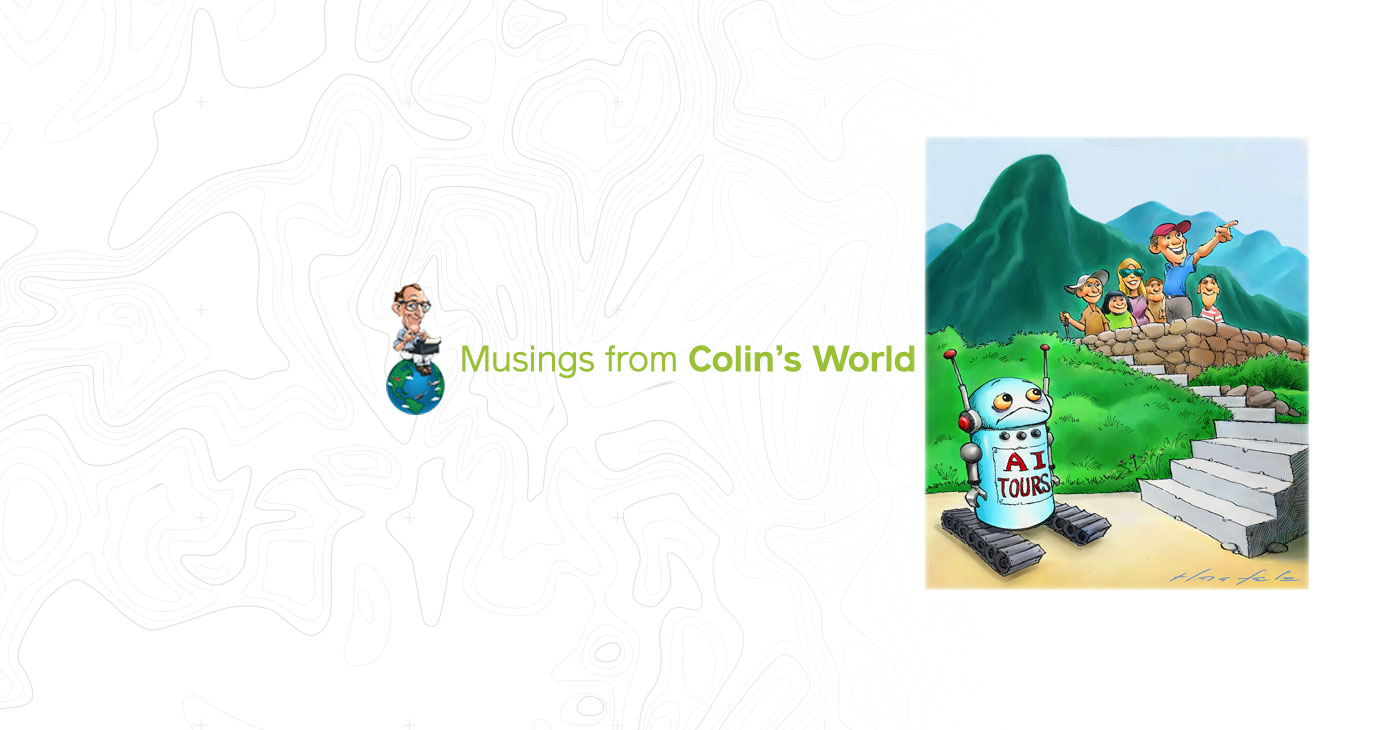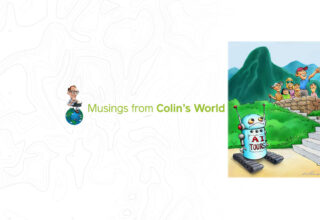I see that some of the retail stores are expanding their self-check operations and cutting back their human cashiers. I’ve heard that some of the big stores are moving toward being exclusively self-check.
“It will all be self-check soon, my friend, we are old fossils,” said a friend whose opinion I respect. Maybe he is right. I hope not.
One area, however, where I don’t expect automated customer service to take over is travel. I think people who travel are driven by purposes in opposition to the trend toward increased automation and digitization of everything. People who travel want to interact with other people. They don’t want to live in a world devoid of human beings. If that was what they wanted, it would be easier to stay home.

AI and the End of the World
Now we are in the midst of a new AI revolution. With the release of ChatGPT there is a flood of speculation about how AI will take over practically everyone’s jobs. A number of those who have pioneered its development are now suggesting that it may lead to the extinction of human beings. It’s a heyday for hyperbole. Stephen Hawking said AI could be “the worst event in the history of our civilization.”
AI is certainly powerful, and not to be taken lightly. But to the extent that service functions in society are taken over by AI, it will create a need for people to compensate by seeking more hands-on, tangible experiences.
Travel will be one of the ways people do that. I don’t believe that AI will take over the travel world. On the contrary, it will create an opportunity for travel companies to distinguish themselves because they offer products and services with real human service and interaction. That will become even more of a premium. You see that happening now in the catchwords used for selling travel, such as “immersion” and “authentic experiences.”
Travel is one of the antidotes we still have to living in a world that is often so ethereal and abstract that we are in danger of losing our psychological footing. As more areas of life are taken over by artificial intelligence, it will create a greater need to compensate with physical, hands-on experience. Travel is the ideal way to do that. When traveling you are constantly receiving new impressions as you are out there moving through the physical world.
The Human Touch
I almost always go for the human cashier. It’s the most enjoyable moment of the shopping experience for me. It adds a little spark to the errand of grabbing some mundane item at the store. I like that interaction. Does that make me an anachronism in today’s world?
I don’t think so. I suspect there are many others, perhaps even a majority, who feel the same. Sure, it’s cool to be able to do your own check-out. I like the option. I have done it when I want to grab something quickly and get out of a crowded store. At CVS I’ve gotten used to those bossy checkout terminals that bark their orders to you in a manner that seems somehow presumptuous, though it’s just a machine. I use them sometimes. But in general, I prefer a person.
I don’t want to do my own check-out on a machine and then have to prove I am innocent of thievery by showing a receipt to a security person at the door. They’ve placed their human resources at the wrong place.
I like saying hello to the cashier. I like making a note of that person’s name, having a bit of a conversation. It’s great when you manage to say something that makes someone smile. I never liked the idea of strictly functional relationships, such as: I give you money, you give me merchandise, not a word further. I enjoy the human element.
I think that’s normal. Human beings are one of the most social of species. People need the presence of other human beings. I think those businesses that are trying to phase out people from their operations are missing something important about the reasons people shop the way they do, and go where they go.
Trader Joe’s seems to understand this. I haven’t seen automated checkout stations there. The people and the customer service culture constitute a large part of that company’s value proposition, and why it is appealing to so many customers.
The Equal and Opposite Reaction
I’m not one who resists technological change in general, as if one has any choice in the matter. I use many AI applications, sometimes happily, sometimes not. We all do, whether we realize it or not. I enjoy adopting new technologies that I find useful. But I don’t embrace the vision of a world that is phasing out the human element.
Artificial intelligence is great for many functions. But not for everything. In 1982, John Naisbitt, a self-styled “futurist” who wrote Megatrends: Ten New Directions Transforming Our Lives, coined the phrase “high tech/high touch.” As our world becomes increasingly digitized and ethereal, people will look for ways to compensate for the lack of tangible sensory experiences by seeking experiences that are more tactile and appeal to the senses. I think he hit the nail on the head with that one. Travel will be one of those areas in which people seek to compensate for a lack of tangible, physical experiences. We have been seeing this for a long time already.
I really can’t see automated customer service gaining a lot of traction in the travel industry. There are places where it is fine, ATMs for example. But there are also many situations in which dealing with a human being would be easier, more pleasant and more efficient for the customer.
When I want to experience a new place, I want to be able to do it with a person I can trust, who really knows the place. There is no way to substitute for that with any kind of AI. My guide will no doubt use AI as part of his or her work. But it will not take over the job, only help the guide do it better.
AI will certainly have its effect on the travel experience, and already has. Almost anything that can be automated will be. But there will be those who don’t want to have everything mechanized and dehumanized. I see the travel industry as contrary motion to the drive to dehumanize the world.
People who want to live in an entirely virtual world, devoid of physical contact or direct interactions with other beings don’t need to travel. As for the rest of us, I’d say most people do need to travel. And one of the main reasons is to balance ourselves and not be pulled so deeply into the virtual, cyber world that you lose touch with your essence.
I know what it’s like to become so immersed in work and in meeting deadlines and making numbers add up that you forget the fact that you need to get out in the world. But you do. It’s good to be reminded occasionally. I recently traveled for the first time after months of staying home, and it brought me back to life in ways I didn’t even realize I needed. Travel reminds you, and it immerses you again in real life.
Your humble reporter,
Colin Treadwell

